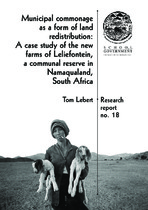Municipal commonage as a form of land redistribution: A case study of the new farms of Leliefontein, a communal reserve in Namaqualand, South Africa
Abstract
This paper examines the
implementation of a quasi-commercial
land use system on newly acquired
municipal commonage in Leliefontein, a
former ‘coloured reserve’ in Namaqualand,
Northern Cape. This land has been acquired
ostensibly for use by all of the reserve’s
residents. A Commonage Committee made
up of community members and state
representatives has been set up to manage
this land on behalf of the municipality. After
describing the management framework that
has been put in place, this paper investigates
how the implementation of this framework is
actually unfolding on the ground. This
investigation is based on fieldwork
undertaken in Leliefontein over the course of
2003 and the first half of 2004.

